
The Warring States and Ancient Greece
Author: Pan Yue
Price: RMB 128
Paperback, 194 pages
Published by New World Press
As the world is undergoing dramatic changes unseen in a century, China and the West are once again standing at the crossroads of properly understanding each other. Though well acquainted with each other’s science, technology, economy, and even culture, they are virtual strangers with regard to understanding each other’s civilization core.
British philosopher Francis Bacon said, “Histories make men wise.” The Warring States and Ancient Greece by Pan Yue, director of the Overseas Chinese Affairs Office of the State Council, takes a dive into history to explore the origin of Chinese and Western civilizations and demonstrates the significance of exchanges and mutual learning.
“There are profound similarities and differences between the Chinese civilization and the Western civilization. A comparative study of them is necessary for mutual understanding,” the author says in the introduction. Then he shares an example. Westerners are surprised by the Chinese obsession with “unification” and “order” while the Chinese are surprised by the Western depreciation of these two concepts. This difference in values can be traced back to the Warring States Period (475-221 B.C.) and ancient Greece, when China and the West were in a similar situation and yet each showed totally different results.
The Warring States and ancient Greece coexisted for several centuries. They nurtured the core elements of each civilization and the main body of the book focuses on that in two chapters.
Between the fifth and the third century B.C., ancient China and ancient Greece were remarkably similar. They were both decentralized due to civil wars and in both of these war-torn states, there emerged campaigns for unification. Finally, a great number of scholars in both states advocated unification, including Confucians, legalists, Daoists, and political strategists in pre-Qin China, as well as philosophers and orators in ancient Greece.
However, what came out of the Greek unification campaign was the Empire of Alexander the Great (336-323 B.C.), which quickly split into three successor kingdoms that became embroiled in wars for many years before they were finally annexed by Rome. Rome retained the culture and art of Greece but discarded its political system.
Far away in China, the Warring States’ struggle for unification ended with the establishment of a unified Qin Dynasty (221-206 B.C.). Similar to the Empire of Alexander the Great, the Qin Empire survived only for 14 years, but the fragmented empire soon reunified under the Han Dynasty (202 B.C.-A.D. 220), and the new empire lasted for over 400 years.
Unlike Rome, the Han Dynasty that followed the Qin basically adopted the political system of the Qin. Thereafter, the Qin and Han system was inherited and followed by the subsequent dynasties for more than 2,000 years.
Why did similar historical conditions bring about different outcomes? The answer lies in some of the great thinkers of that period.
The author points out that the Warring State Period saw the emergence of most ideologies characteristic to Chinese thought, including Confucianism, Daoism, legalism, and the Military Strategy School. The fierce competition in that period overthrew aristocracy based on blood ties and marked the beginning of political meritocracy. Moreover, wars also bred the junxian system (a system of dividing the territory into prefectures and counties which were under a centralized administration), which later became the basic ruling system of the unified dynasties.
Then the author goes on to tell the stories of some great thinkers such as Confucius (551-479 B.C.), Mencius (372-289 B.C.) and Xunzi (313-238 B.C.). The conclusion is that despite the huge philosophical differences among the Hundred Schools of Thought, they all adhered to the common bottom line, which was the establishment of a unified political order. The ultimate goal was “All under Heaven.” On this common ground of pursuing unity, the Warring States became a melting pot of distinct ideologies. And the result was the formation of a super stable unified state structure. It allowed flexibility and adaptability that ensured the Chinese civilization’s survival.
The second chapter notes that while the Warring States Period developed in China, the city-states system in the Greek peninsula entered a period of crisis (404-338 B.C.). It saw the emergence of some famous Western thinkers such as Isocrates (436-338 B.C.) and Aristotle (384-322 B.C.), whose great influence lasted throughout centuries and is felt even today.
The Greek love for freedom made the word “Greek” become a synonym for “wisdom.” The Chinese love for order has sustained the Chinese civilization as the only civilization with the same origin and written language that still exists in the form of a state today.
Pan says the difference between the Western priority of “freedom” and the Chinese priority of “order” should not be an obstacle in exchanges between Chinese and Western civilizations; instead it should become the basis for mutual learning. Only a civilization that understands introspection, inclusiveness, harmonious coexistence and mutual learning can be truly sustainable. For this reason, China and the West should sit down and have a heart-to-heart talk.
Martin Jacques, a senior fellow at the Department of Politics and International Studies at Cambridge University, speaks highly of the book.
“It is testimony to the richness of human history and the diversity of human experience. A knowledge of history, and a resulting respect for difference, opens up the possibility of a new kind of creative dialogue between the West and China based on mutual respect and understanding,” he says.
George Papandreou, former prime minister of Greece, writes in the foreword, “A sustainable civilization is one that can examine itself, tolerate and accommodate others, coexist in harmony with others, and learn from others – this is a common wisdom of both the Chinese civilization and the Greek civilization.”